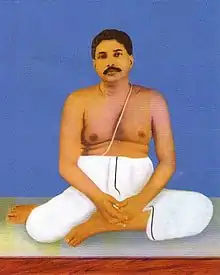Anukulchandra Chakravarty | |
|---|---|
Anukulchandra Chakravarty | |
 | |
| Personal | |
| Born | Anukulchandra Chakravarty 14 September 1888 |
| Died | 27 January 1969 (aged 80) |
| Religion | Hindu |
| Nationality | Indian |
| Children | 6 |
| Founder of | Satsang (Deoghar) |
Anukulchandra Chakravarty (14 September 1888 – 27 January 1969), popularly known as Sree Sree Thakur, was a physician, a philosopher, a spiritual leader[1][2][3] and the founder of Satsang, in Deoghar.[4][5] He was born in a Brahmin family[6]
Early life and service

Anukulchandra Chakravarty was born in the Himaitpur village of Pabna district of East Bengal, British India which is now a part of Bangladesh. Sivachandra Chakravarty and Monomohini Devi were his father and mother respectively. As a young medical student in Calcutta, Anukulchandra started serving and treating the slum dwellers in 1911. After six years of study, he came back to Himaitpur and began to practice medicine.<[7]
In 1913, Anukulchandra was spiritually initiated by his mother. After his initiation, he along with his friends and companions started doing intense kirtan. During kirtan, he often went into a state of trance, fell on the ground unconsciously and uttered messages in that condition. His going into trance during kirtan, delivering holy messages during trance and the devotion of those around him started attracting many more people. As a number of people came to his village to visit him began to settle permanently, gradually his village home was converted into an ashram.
Anukulchandra Chakravarty's service to the people as a doctor, his speaking in tongues in a state of trance as well as his advice and guidance to his followers helped him secure a position as a religious leader. The personality, life and teachings of Thakur Anukulchandra mediates between science and spirituality, personal affirmation and self-transformation, individualism and social commitment has put him in the class of prophets or avatars of the Indian religious tradition. His devotees address him as Yuga Purushottam or the Prophet of the modern age.[8] on the other hand he is the founder of "satsanga" at deoghar in Bihar now Jharkhand.
Death
Anukulchandra died on 27 January 1969. The Government of India released a commemorative postage stamp, in 1987.[9]
References
- ↑ Nayak, G.C. (2006). "Hinduism: A Descriptive and/or Prescriptive Appraisal of Other Religions". In Gort, Jerald D.; Jansen, Henry; Vroom, Hendrik M. (eds.). Religions view religions : explorations in pursuit of understanding. Rodopi. p. 68. ISBN 90-420-1858-5. OCLC 901183160. Archived from the original on 3 December 2019. Retrieved 28 February 2020.
- ↑ নেতাজি সুভাষচন্দ্র ও ঠাকুর অনুকূলচন্দ্রের সম্পর্ক, প্রায় অনালোচিত এক অধ্যায়. Bartaman Patrika (in Bengali). 22 March 2018. Archived from the original on 29 October 2018. Retrieved 25 August 2020.
- ↑ Hosena, Selinā; Islam, Nurul (2010). Bāṃlā ekāḍemī caritābhidhāna. Dhaka: Bāṃlā Ekāḍemī. ISBN 978-984-07-4354-4. OCLC 623263673.
- ↑ "Deoghar Tourism". Archived from the original on 19 February 2016. Retrieved 14 February 2016.
- ↑ "Politicians turn devotees at Satsang Vihar event". The Times of India. 15 February 2014.
- ↑ Ainy (12 June 2016). "Sri Sri Thakur Anukul Chandra". Retrieved 21 January 2022.
- ↑ Roy, Rajarshi (February 2019). Satsang, a Contemporary Religion of Convergence (PDF). 2nd International Academic Conference on Humanities & Social Science. Rome. pp. 231–238.
- ↑ "Sree Sree Thakur Anukulchandra". www.satsang.org.in.
- ↑ "Postage Stamps: Stamp issue calendar 2014, Paper postage, Commemorative and definitive stamps, Service Postage Stamps, Philately Offices, Philatelic Bureaux and counters, Mint stamps (unused stamps)". postagestamps.gov.in. Archived from the original on 21 January 2021. Retrieved 8 December 2019.
Other sources
- Sarkar, Rabindra Nath (2010). The revelation after the latest revealed (First ed.). Kolkata: Sanskrit Pustak Bhandar. OCLC 775646694.
- Islam, Kazi Nurul (2011). "Historical Overview of Religious Pluralism in Bengal" (PDF). Bangladesh e-Journal of Sociology. Dhaka. 8 (1): 28.
- Sarkar, Rabindra Nath (1987). The Latest Revelation in the East (First ed.). Kolkata: Sanskrit Pustak Bhandar.
- Pandey, Rajesh (2015). "Jharkhand governor inaugurates Deoghar function". The Times of India.